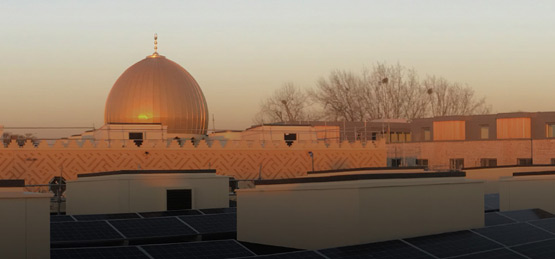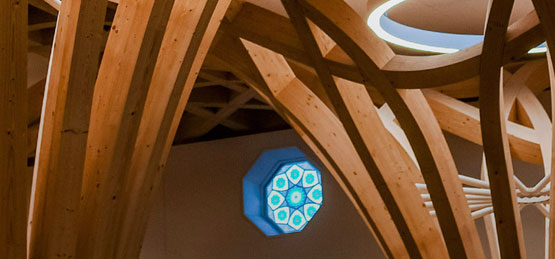A calm oasis within a grove of trees
The Islamic garden at the front of the mosque is open to everyone, and provides a quiet transition from the city to the prayer space, as well as a taste of Jannat al-Firdaws, the Paradise Gardens described in the Qur’an.
The central feature is an octagonal stone fountain, designed in collaboration with water specialist Andrew Ewing, since running water is a vital element in the Paradise Gardens. There are curved oak benches, designed and made by cabinet-maker Tom Zinovieff, where visitors can sit and enjoy the sound and movement of the water, the colours and fragrances of the flowers, and the shade of the trees. On each side of the fountain area is a small chahar-bagh (4-fold garden) featuring crab-apple trees and bursting with mixed seasonal planting throughout the year.
Yew hedges enclose dense beds of naturalistic perennials and damask roses, giving the overall effect of an informal, carpet-like pattern of colour, scent and texture within a strong geometry.
In this way the gardens strike a harmonious balance between Islamic structure and relaxed English herbaceous and naturalistic planting. A concern for sustainability, biodiversity and insect-friendly planting has also been a constant theme in the selection of plants.
There is also the Community Garden on Mill Road outside the Mosque boundary, open to the public all the time, which has been planted with fastigiate birch trees as well as shrubs and flowers. Around the perimeter fence of the whole site is a mixture of evergreen and floral climbers including Schizophragma hydrangeoides, Clematis armandii and Pileostegia viburnoides – the latter being particularly attractive to bees and other insects. The gardens were designed by specialist Islamic Garden Designer Emma Clark in association with Urquhart and Hunt Landscape Design Studio.
“The contemplative green spaces of the new mosque offer worshippers and passers-by respite from the hectic pace of the city and bring together traditional Islamic and British features.”




